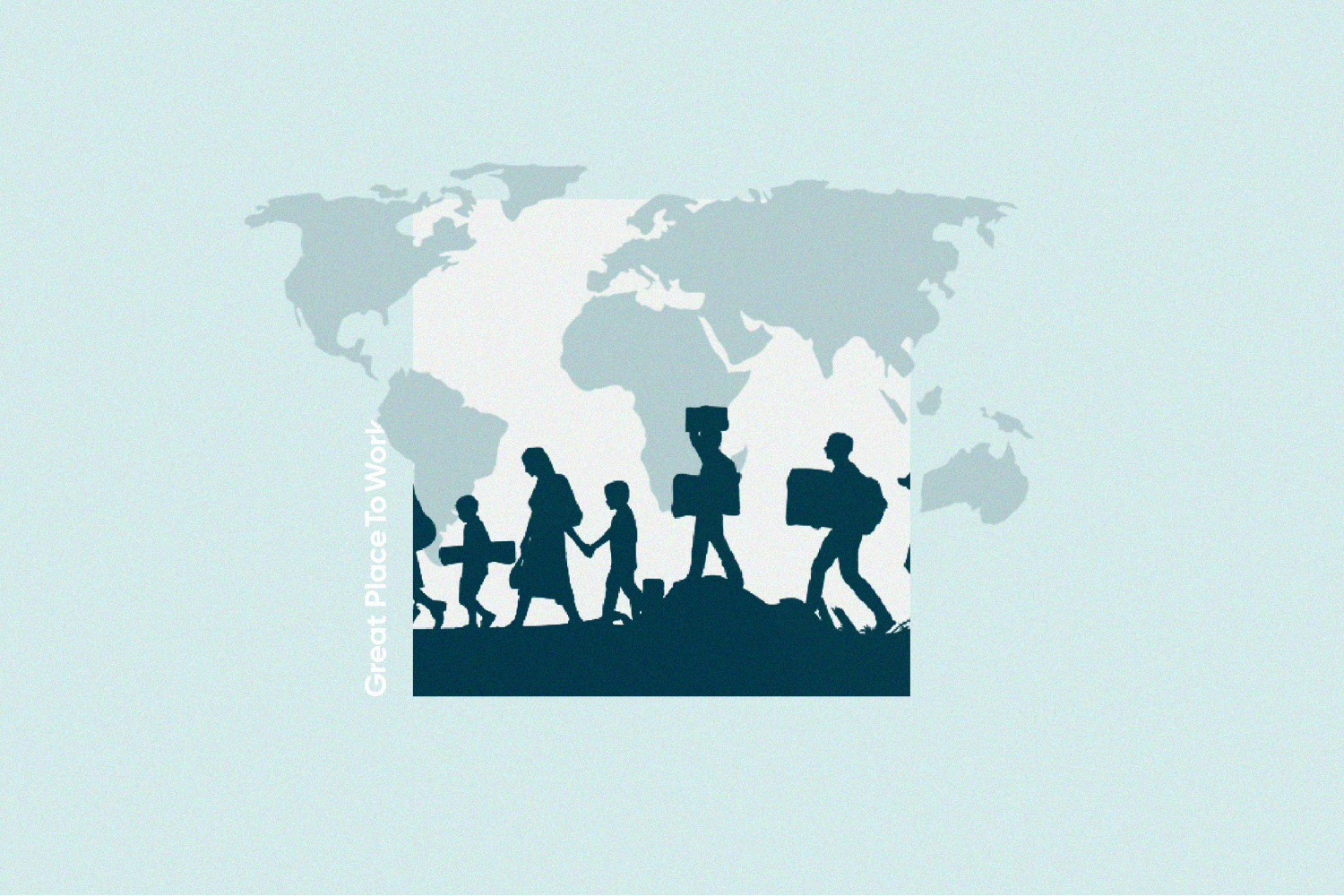DEIB, Diversity & Inclusion, Employee Experience, ERGs
DHL and Accenture share how they are helping refugees rebuild through jobs and community engagement.
According to the United Nations, more than 117 million people globally will be forcibly displaced or stateless in 2023.
Of those, more than 29 million are refugees.
The war in Ukraine is just the latest conflict to force people to flee their homes. They join Afghanis, Venezuelans, Syrians, Iraqis, and others looking to start life anew.
Some employers see an opportunity to make a positive impact on people affected by the refugee crisis.
“We know from experience that companies have an important role to play in times of crisis,” says Yolanda Friend, North America inclusion and diversity lead at Accenture.
As of June 2022, the professional services company had provided more than $5 million in crisis relief donations in support of nonprofit relief organizations working to help people in Ukraine and those who are being displaced to neighboring countries, Friend says.
These efforts were one of the reasons Accenture was named No.16 on the 2023 PEOPLE® Companies that Care List produced by Great Place To Work®.
Global companies are especially attuned to the plight of refugees. No. 24 on the Companies that Care list DHL Express has operations in over 220 countries and territories, and has been an active participant in refugee resettlement programs for years.
“We offer three kinds of support,” says Fadzlun Sapandi, EVP of global human resources, DHL Express.
1. Language and cultural support. This includes local language training, including language guides, translations of contractor documents, and connection to publicly available resources, such as government-funded cultural training.
2. Internal networks and mentoring. Sapandi says this includes programs that connect employees who are refugees to other DHL employees for mentorship opportunities and job training.
3. Community partnership. DHL partners with local refugee organizations in the country where a refugee employee has relocated, depending on the resources made available by local governments. These partnerships with organizations like Teach First Deutschland help refugees integrate into their new community with language classes and job placement when an open role at DHL isn’t available.
What refugees need at work
What are the top barriers facing refugees in the workplace? One of the biggest is something most people take for granted: Language fluency and communication.
Even if a refugee can speak a common language, there might be other barriers to finding belonging and connection at work.
“What would be also present is the cultural differences and unfamiliarity with the local work processes, practices, and regulation,” says Sapandi.
"We know from experience that companies have an important role to play in times of crisis." - Yolanda Friend, Accenture
To overcome obstacles, DHL relies on its diversity, equity, inclusion and belonging (DEI&B) programs.
‘We use that framework to say, ‘We all belong in the workplace,’ and to encourage our management team,” says Sapandi. A DEI&B framework helps managers understand the unique skills refugees might bring to their work.
“These are professionals in their own country, and they have something to offer,” Sapandi says.
Friend agrees. “Work opportunities for refugees provide a critical pathway to long-term economic and social resilience,” she says, “and it's important to recognize the skills and experiences they can bring to the workforce.”
DHL also offers to help refugees navigate their new community, including getting a driver’s license where one is necessary and available.
Getting all employees involved
At Accenture, an employee resource group (ERG) for refugees offers opportunity for all employees to participate in programs to support refugees.
Accenture employees volunteer with local resettlement agencies, participate in donation drives and work with partners to support refugee job seekers through résumé reviews, practice interviews and training workshops. Accenture employees also partner with legal and government groups to offer legal clinics to help asylum seekers with the application process.
Within Accenture, the resource group collaborates with other ERGs to host listening sessions, celebrate cultural moments and build a community of support for refugee colleagues.
“Collectively, our Accenture people have contributed more than 3,000 volunteer hours to help refugees and their families,” Friend says.
“These are professionals in their own country, and they have something to offer.” - Fadzlun Sapandi, DHL Express
The impact of helping others
The whole workforce can benefit from efforts to help refugees.
Sapandi says that DHL’s efforts have two main impacts for its workers:
- Pride in their company. “It's the pride of giving back to society, connecting people, improving lives,” Sapandi says. “That's our purpose.”
- Connection with colleagues. “We are so diverse at DHL Express,” Sapandi says. “We have people all over the world from different walks of lives, different races, religion.”
The diversity created by bringing in so many different voices — including refugees — has a direct and measurable impact on business performance. “You see that impact being shown really clearly,” she says. “Diversity in itself enriches and fosters innovation.”
How you can get involved
Accenture and DHL share how to best support your refugee colleagues:
1. Keep engaging after the hiring process
“It's critical to recognize that the work to create a welcoming culture for refugees in the workplace continues beyond an initial hiring decision,” says Friend.
It falls to all employees to create a welcoming environment that ensures newly hired refugees can succeed.
2. Practice patience and understanding
It’s extremely hard for business leaders who don’t have similar life experiences to fully understand the perspective of a refugee. “It’s critical to approach it in a very empathetic way,” says Sapandi.
It’s crucial to have awareness and offer grace for new employees trying to rebuild their lives, she says.
3. Understand the difference between language and cultural barriers
Even when a refugee doesn’t have a language barrier, cultural integration could create challenges. What are the norms for the work environment in a new country?
“Simple things from the way you eat to how you greet someone can be viewed as offensive, but that’s never the intention,” Sapandi says.
4. Focus on mentorship and networking
It’s crucial for refugees to have a buddy, someone they can rely on to talk about their day-to-day challenges that might be inappropriate to discuss with a manager.
“Mentoring support cannot be underestimated,” Sapandi says.
Get Started
Compare the experiences of your employees with the most credible benchmark data available. Learn more about our data and how to earn Great Place To Work Certification™.











